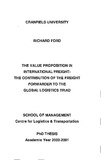JavaScript is disabled for your browser. Some features of this site may not work without it.
| dc.contributor.advisor | Wright, D. | |
| dc.contributor.author | Ford, Richard | |
| dc.date.accessioned | 2010-06-08T12:04:48Z | |
| dc.date.available | 2010-06-08T12:04:48Z | |
| dc.date.issued | 2001-06 | |
| dc.identifier.uri | http://hdl.handle.net/1826/4439 | |
| dc.description.abstract | The freight forwarder has been threatened with 'disintermediation' for years. This research looks at the relationships in the global logistics triad comprising the forwarder, the shipper, and the airline or ocean carrier. The middle-man in service industries such as freight forwarding performs the service of intermediation. He is defined as one who reduces or eliminates the need for a buyer to form exchange relationships, ad hoc or relational, with a number of suppliers by concentrating the buyer's need for information at the buyer interface and expanding the buyer's requirement for choice or selection at the supplier interface. This vendor contraction and expansion are explored in the qualitative first phase of the research which examines the relationships, shared functions, and roles of the members of the global logistics triad as well as the contribution of the freight forwarder. Modal differences are prominent. Shippers are closer in a relational sense to ocean carriers than to airlines - the exporter is much more likely to use a shipping line directly than to use an airline. This modal difference owes much to the airfreight industry's origins in passenger transportation. It is reflected in the airlines' perspective of the forwarder: as customer because of forwarders' purchase of space, as competitor because the airline is being excluded from dealing directly with the shipper, and as collaborator because of the common threat of the integrator. To the ocean carrier, the forwarder is customer and competitor only - collaboration is rare. Factors that affect the custome r/competitor/colla boratort richotomy in airfreight include freight capacity, the level of forwarder commitment to space, the status freight has with the airline, and the makeup of the airline's customer portfolio. The factors that affect the customer/ competitor dichotomy in ocean freight include the extent of LCL (Less than Container Load) cargo and 3PL (3rd Party Logistics) services offered by the shipping line. The modal differences and complexities inherent in the global airfreight triad were explored in the subsequent quantitative phase. What value does the airfreight forwarder offer to the shipper that would compel him to not disintermediate this intermediary and deal directly with the airline? It is surmised the forwarder offers value through cost reduction, specifically the costs of transacting with a number of airlines. This second phase is based on Transaction Cost Analysis using an experiment-derived survey instrument. The transaction costs of searching for vendors, developing relationships with them, monitoring their performance, handling problems that may arise, and managing potential opportunistic behaviour were examined. The shi pper- respondents - made up of British global exporters who used airfreight - were asked to compare their perception of these costs for the forwarder and for the airline. They were also asked about production cost/price advantages as well as demographic information that was presumed to affect these perceptions. The differences between these perceptions of transaction costs were highly significant with the perception of offering lower transaction costs, and hence greater value, lying with the forwarder. The shippers also positively viewed forwarders regarding the production cost/price advantages. However, the demographic variables played little part in the shippers' differential perceptions of transaction costs. Contribution is made to Transaction Cost Theory by suggesting the inclusion of triadic relationships and the intermediary as a governance alternative. In addition, the freight forwarding industry and global distribution benefit. Finally, at the level of method, the TC comparison technique used offers a fresh approach to comparing primary and intermediary vendors. | en_UK |
| dc.language.iso | en | en_UK |
| dc.publisher | Cranfield University | en_UK |
| dc.rights | © Cranfield University, 2001. All rights reserved. No part of this publication may be reproduced without the written permission of the copyright holder. | en_UK |
| dc.title | Value proposition in international freight : the contribution of the freight forwarder to the global logistics triad | en_UK |
| dc.type | Thesis or dissertation | en_UK |
| dc.type.qualificationlevel | Doctoral | en_UK |
| dc.type.qualificationname | PhD | en_UK |
